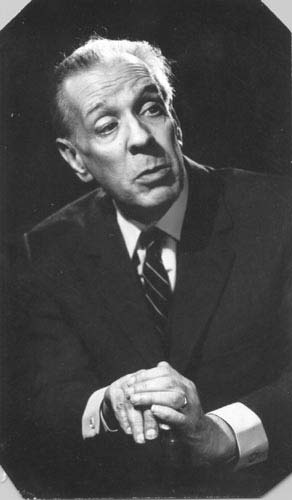Jorge Luis Borges
Jorge Luis Borges (24 August 1899 – 14 June 1986) was an Argentine writer, poet, essayist, and librarian who is one of the foremost figures in 20th-century literature. His work embraces the character of unreality in all literature. Borges' most famous works are compilations of short stories intertwined with themes of dreams, labyrinths, libraries, animals, fictional writers, and mythology. Borges himself was fluent in several languages and was a profound philosopher, critic, and a keen observer of society.
Biography[edit | edit source]
Jorge Francisco Isidoro Luis Borges Acevedo was born in Buenos Aires, Argentina. His family had a strong military and scholarly tradition, which influenced his vast array of interests. Borges was educated in Europe before returning to Buenos Aires in 1921, where he began publishing his poems and essays in surrealist literary journals. He held various teaching and library positions throughout his life, the most notable being the director of the National Public Library in Buenos Aires in 1955.
Literary Career[edit | edit source]
Borges' early work was in Spanish and was influenced by European culture, philosophy, and ancient literature. He was a key figure in Spanish-language literature, contributing significantly to the modernist and then post-modernist movements. His first major work, Fervor de Buenos Aires (1923), signaled his break from the local poetry scene and showcased his unique style, which would become more pronounced in his later works.
His most acclaimed collections, Ficciones (1944) and El Aleph (1949), consist of short stories that explore complex themes of infinity, mirrors, labyrinths, and the nature of fiction itself. Borges' stories are renowned for their brevity and depth, challenging the boundaries between reality and fiction.
Themes and Style[edit | edit source]
Borges was fascinated with the idea of the infinite, which is evident in his frequent use of mirrors, mazes, and recursive plots. His writing style is characterized by its precision, intellectual depth, and a unique blend of philosophical speculation, factual narrative, and mythological allusions. Borges often employed fictional writers and books within his stories, blurring the lines between reality and fiction and questioning the nature of authorship and the creative process.
Influence[edit | edit source]
Borges' influence on literature and other fields has been profound and widespread, impacting authors, philosophers, and artists around the world. His work has been seen as a precursor to postmodernism and has contributed to the development of magical realism. Despite never winning the Nobel Prize in Literature, Borges is regarded as one of the literary giants of the 20th century.
Legacy[edit | edit source]
Jorge Luis Borges died in Geneva, Switzerland, in 1986, but his work continues to be highly regarded and influential. He left behind a legacy that transcends the Spanish-speaking world, making significant contributions to world literature, critical theory, and philosophy. Borges' exploration of complex themes and his innovative narrative techniques have cemented his status as a towering figure in literary history.
Search WikiMD
Ad.Tired of being Overweight? Try W8MD's physician weight loss program.
Semaglutide (Ozempic / Wegovy and Tirzepatide (Mounjaro / Zepbound) available.
Advertise on WikiMD
|
WikiMD's Wellness Encyclopedia |
| Let Food Be Thy Medicine Medicine Thy Food - Hippocrates |
Translate this page: - East Asian
中文,
日本,
한국어,
South Asian
हिन्दी,
தமிழ்,
తెలుగు,
Urdu,
ಕನ್ನಡ,
Southeast Asian
Indonesian,
Vietnamese,
Thai,
မြန်မာဘာသာ,
বাংলা
European
español,
Deutsch,
français,
Greek,
português do Brasil,
polski,
română,
русский,
Nederlands,
norsk,
svenska,
suomi,
Italian
Middle Eastern & African
عربى,
Turkish,
Persian,
Hebrew,
Afrikaans,
isiZulu,
Kiswahili,
Other
Bulgarian,
Hungarian,
Czech,
Swedish,
മലയാളം,
मराठी,
ਪੰਜਾਬੀ,
ગુજરાતી,
Portuguese,
Ukrainian
Medical Disclaimer: WikiMD is not a substitute for professional medical advice. The information on WikiMD is provided as an information resource only, may be incorrect, outdated or misleading, and is not to be used or relied on for any diagnostic or treatment purposes. Please consult your health care provider before making any healthcare decisions or for guidance about a specific medical condition. WikiMD expressly disclaims responsibility, and shall have no liability, for any damages, loss, injury, or liability whatsoever suffered as a result of your reliance on the information contained in this site. By visiting this site you agree to the foregoing terms and conditions, which may from time to time be changed or supplemented by WikiMD. If you do not agree to the foregoing terms and conditions, you should not enter or use this site. See full disclaimer.
Credits:Most images are courtesy of Wikimedia commons, and templates, categories Wikipedia, licensed under CC BY SA or similar.
Contributors: Prab R. Tumpati, MD






